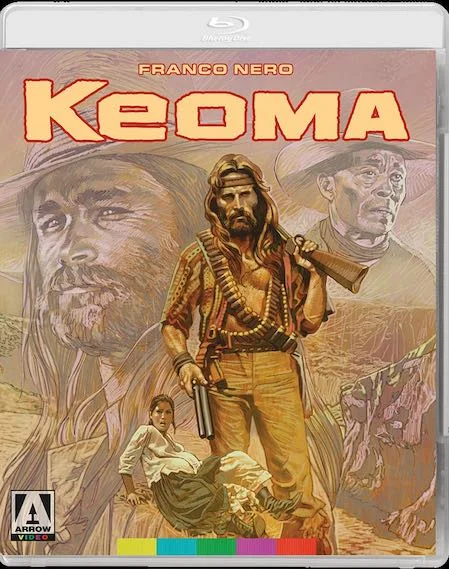KEOMA (Blu-ray Review)
Starring Franco Nero, William Berger, Olga Karlatos, Woody Strode, Orso Maria Guerrini, Gabriella Giacobbe, Antonio Marsina, Joshua Sinclair, Donald O’Brien. Directed by Enzo G. Castellari. (1976/101 min).
The problem with spaghetti westerns is they're all inevitably compared to those made by Sergio Leone, whose shadow continues to loom so large over the entire genre that it’s difficult to assess them on their own merits. Many directors simply cop his moves without understanding his artistry. Others make their way overseas so badly dubbed and edited that they’re nearly unwatchable.
So Keona comes as sort-of a surprise.
Franco Nero (no stranger to the genre) is the title character, a half-breed who returns to the mining town where he was raised, only to find its people suffering from a plague. The sick are kept against their will in a nearby camp by Caldwell (Donald O’Brien), who runs the town with an iron fist, allowing no one to leave – to say nothing of bringing back medicine to cure the sick. Keoma ends up saving a pregnant woman (Olga Karlatos) from being quarantined, raising the ire of Caldwell and the thugs who work under him.
Keoma’s adoptive father, William Shannon (William Berger, also no stranger to the genre), informs him his three stepbrothers are also working for Caldwell. The emancipated slave to helped raise him, George (Woody Strode), has since become the town drunk. Anyone who’s seen even a couple of westerns can probably figure out what comes next: Keoma decides to use his considerable killing skills to try and take down Caldwell... with a bit of assistance from William and George.
The plot is pretty standard stuff, but what’s surprising about Keoma is its creative ambition. Made at a time when the reign of the spaghetti western was nearing its end, director/co-writer Enzo G. Castellari takes a slightly more cerebral approach to the material, specifically the recurring presence of death –– personified as an old woman –– always lurking near Keoma, who’s been a killer most of his life. Castellari is something of a surprise, as well. No stranger to spaghetti westerns himself, his entire career has been pretty imitative. But here, he displays brief moments of artistry I’ve personally never seen in the genre, such as numerous flashbacks which share the same space as the present. Though generally pretty somber in tone, the scene where Keoma explains the cost of bullets to four dumb henchmen is as amusing as anything Leone put together in his Dollars trilogy.
Not bad for a director whose greatest claim-to-fame for American audiences was 1990: The Bronx Warriors.
However, another way Keoma escapes Leone’s shadow is a bit more dubious. The music score by Guido & Maurizio De Angelis is godawful, full of grating, tuneless songs with lyrics that often narrate the very scenes we’re watching. The female vocals border on hysterical, while a few numbers are almost comically grunted. In one of the bonus features, Austin Fisher does indeed mention that the score remains one of the most polarizing aspects of the film (Nero loves it, though).
Other than that, Keoma is an interesting late entry in the spaghetti western genre. The film will definitely be of interest to Django fans, as it’s similarly structured (in fact, it was retitled as a Django sequel in some parts of the world). It’s suitably violent, with well-choreographed action sequences that draw as much inspiration from Sam Peckinpah as they do Leone. Loaded with interesting bonus features, this Blu-ray rescues a relatively obscure western with a great transfer and is well-worth checking out.





